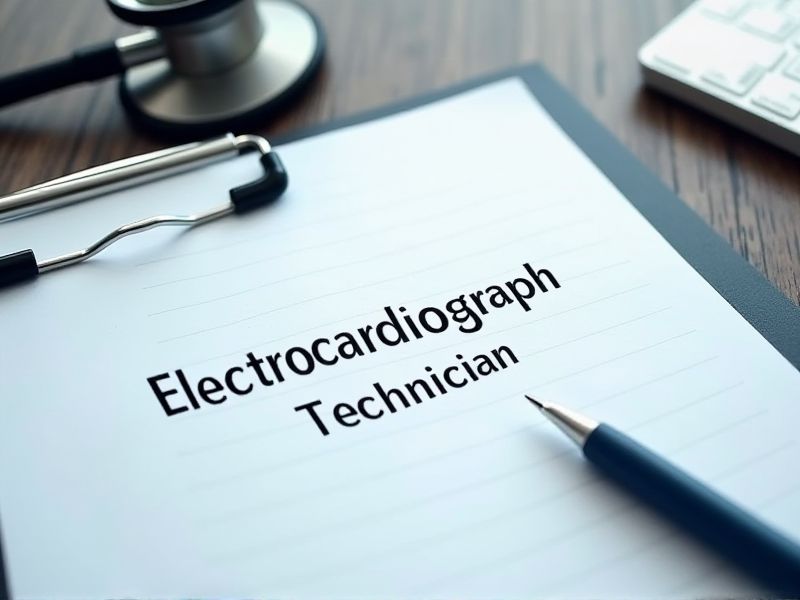
Electrocardiogram Technicians play a vital role in diagnosing heart conditions by accurately recording and interpreting patients' heart activity. With the increasing complexity of modern medical equipment and procedures, certain certifications ensure proficiency and adherence to healthcare standards. These certifications also enhance a technician's career prospects and demonstrate a commitment to professional expertise. Below are some essential certifications for aspiring Electrocardiogram Technicians.
Certified EKG Technician (CET)
Certified EKG Technicians (CETs) are required because certification ensures that the technician adheres to professional standards and best practices in accurately recording and analyzing electrocardiograms. Skills from certification reduce error rates in EKG readings, directly affecting patient diagnosis and treatment plans. Hospitals and clinics often prefer hiring certified personnel, as it demonstrates commitment to quality care and competency. Certification keeps the technician updated on the latest advancements in EKG technology and techniques, improving patient outcomes.
Cardiographic Technician Certification
Cardiographic Technician Certification ensures a standardized level of competence and skill among professionals conducting electrocardiograms, enhancing patient safety and care quality. Certified technicians typically possess a deeper understanding of cardiac anatomy and electrophysiology, which improves diagnostic accuracy. Hospitals and medical facilities often prefer or require certification for electrocardiogram technicians to meet regulatory and accreditation standards. Certification can lead to increased job opportunities and higher earning potential within the healthcare field.
Basic Life Support (BLS) Certification
Basic Life Support (BLS) certification ensures that an electrocardiogram technician can respond to cardiac emergencies, a scenario they are likely to encounter. Understanding BLS techniques enables them to provide initial life-saving interventions until advanced medical professionals arrive. Certification enhances their competence in recognizing life-threatening rhythms during ECG monitoring. Hospitals and clinics often require this certification to ensure all team members are prepared for sudden cardiac events.
Advanced Cardiac Life Support (ACLS) Certification
ACLS certification equips electrocardiogram technicians with critical skills to manage life-threatening cardiac emergencies. This training enhances their ability to identify and respond to abnormal heart rhythms quickly, improving patient outcomes. Certification ensures that technicians can effectively collaborate with healthcare teams during cardiac events. It also demonstrates a commitment to maintaining a high standard of care in increasingly dynamic medical environments.
CPR Certification
CPR certification enables electrocardiogram technicians to respond effectively during cardiac emergencies, enhancing patient survival rates. Understanding CPR protocols complements their skills in monitoring heart activity, ensuring comprehensive patient care. Hospitals and clinics often require this certification to meet healthcare industry standards. The knowledge gained from CPR training increases technician confidence when facing cardiac events, directly impacting patient outcomes.
Registered ECG Technologist Certification
Certification as a Registered ECG Technologist ensures that technicians possess validated skills and knowledge, aligning with industry standards. This leads to improved job prospects and can increase earning potential due to recognized competence. Health facilities benefit from employing certified technologists because it signifies adherence to safety and quality patient care protocols. Certification also fosters continuous professional development, encouraging technicians to stay updated with evolving technologies and practices in the field.
Electrocardiogram Interpretation Certification
Obtaining Electrocardiogram Interpretation Certification enhances an ECG technician's ability to accurately identify critical cardiac anomalies. Certification improves job prospects and may result in higher wages by demonstrating a verified skillset. Hospitals and clinics often mandate certification to ensure standardized care and reduce diagnostic errors. Education through certification programs improves patient outcomes by equipping technicians with the necessary expertise in evolving cardiac care technologies.
Medical Terminology Certification
Certification in medical terminology ensures an electrocardiogram technician understands and correctly interprets complex medical language, reducing the risk of errors in patient records. Knowledge of medical terms enhances communication with healthcare teams, facilitating more effective collaboration and patient care. Certified technicians are often more trusted by employers, increasing job opportunities and career advancement chances. Mastery of medical terminology aids in the accurate understanding of physicians' orders and improves the quality of patient interactions.
Phlebotomy Technician Certification
Phlebotomy Technician Certification equips individuals with fundamental skills in handling blood samples, ensuring accurate patient identification and specimen integrity. In combination with electrocardiogram procedures, these skills enhance patient trust and streamline diagnostic processes. Certification provides standardized training that results in improved patient outcomes. Employers value certified technicians for their verified competence, reducing risks associated with procedural errors.
Patient Safety Certification
Patient Safety Certification helps electrocardiogram technicians adhere to standardized procedures, reducing the risk of human error during tests. It enhances technicians' understanding of patient care protocols, which minimizes potential harm during cardiovascular assessments. Certification ensures technicians are well-versed in emergency response, improving patient outcomes in case of unexpected medical events. It fosters trust among patients and healthcare teams, reinforcing confidence in the quality and reliability of diagnostic services.
Summary
By obtaining certifications, you enhance your professional credibility as an Electrocardiogram Technician. Certification often leads to improved job opportunities and possible salary increase due to demonstrated expertise. Your advanced skills can result in more accurate diagnostics, positively impacting patient outcomes. Employers may also favor you for promotions or specialized roles, given the proven competency.
